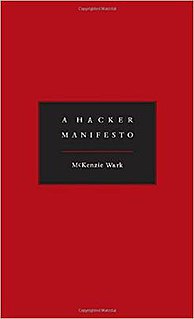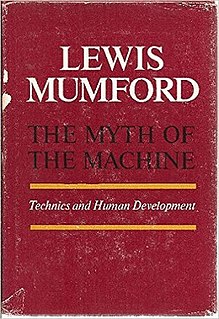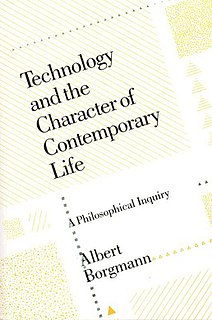 W
WA Hacker Manifesto is a critical manifesto written by McKenzie Wark, which criticizes the commodification of information in the age of digital culture and globalization. It was published in the United States in 2004.
 W
WThe Myth of the Machine is a two-volume book taking an in-depth look at the forces that have shaped modern technology since prehistoric times. The first volume, Technics and Human Development, was published in 1967, followed by the second volume, The Pentagon of Power, in 1970. The author, Lewis Mumford, shows the parallel developments between human tools and social organization mainly through language and rituals. It is considered a synthesis of many theories Mumford developed throughout his prolific writing career. Volume 2 was a Book-of-the-Month Club selection.
 W
WThe Question Concerning Technology is a work by Martin Heidegger, in which the author discusses the essence of technology. Heidegger originally published the text in 1954, in Vorträge und Aufsätze.
 W
WTechnics and Civilization is a 1934 book by American philosopher and historian of technology Lewis Mumford. The book presents the history of technology and its role in shaping and being shaped by civilizations. According to Mumford, modern technology has its roots in the Middle Ages rather than in the Industrial Revolution. It is the moral, economic, and political choices we make, not the machines we use, Mumford argues, that have produced a capitalist industrialized machine-oriented economy, whose imperfect fruits serve the majority so imperfectly.
 W
WTechnics and Time, 1: The Fault of Epimetheus is a book by the French philosopher Bernard Stiegler, first published by Galilée in 1994.
 W
WTechnology and the Character of Contemporary Life: A Philosophical Inquiry is a 1984 book by Albert Borgmann, an American philosopher, specializing in the philosophy of technology. Borgmann was born in Freiburg, Germany, and is a professor of philosophy at the University of Montana.
 W
W“The Work of Art in the Age of Mechanical Reproduction” (1935), by Walter Benjamin, is an essay of cultural criticism which proposes and explains that mechanical reproduction devalues the aura (uniqueness) of an objet d’art. That in the age of mechanical reproduction and the absence of traditional and ritualistic value, the production of art would be inherently based upon the praxis of politics. Written during the Nazi régime (1933–1945) in Germany, Benjamin’s essay presents a theory of art that is “useful for the formulation of revolutionary demands in the politics of art” in a mass-culture society.